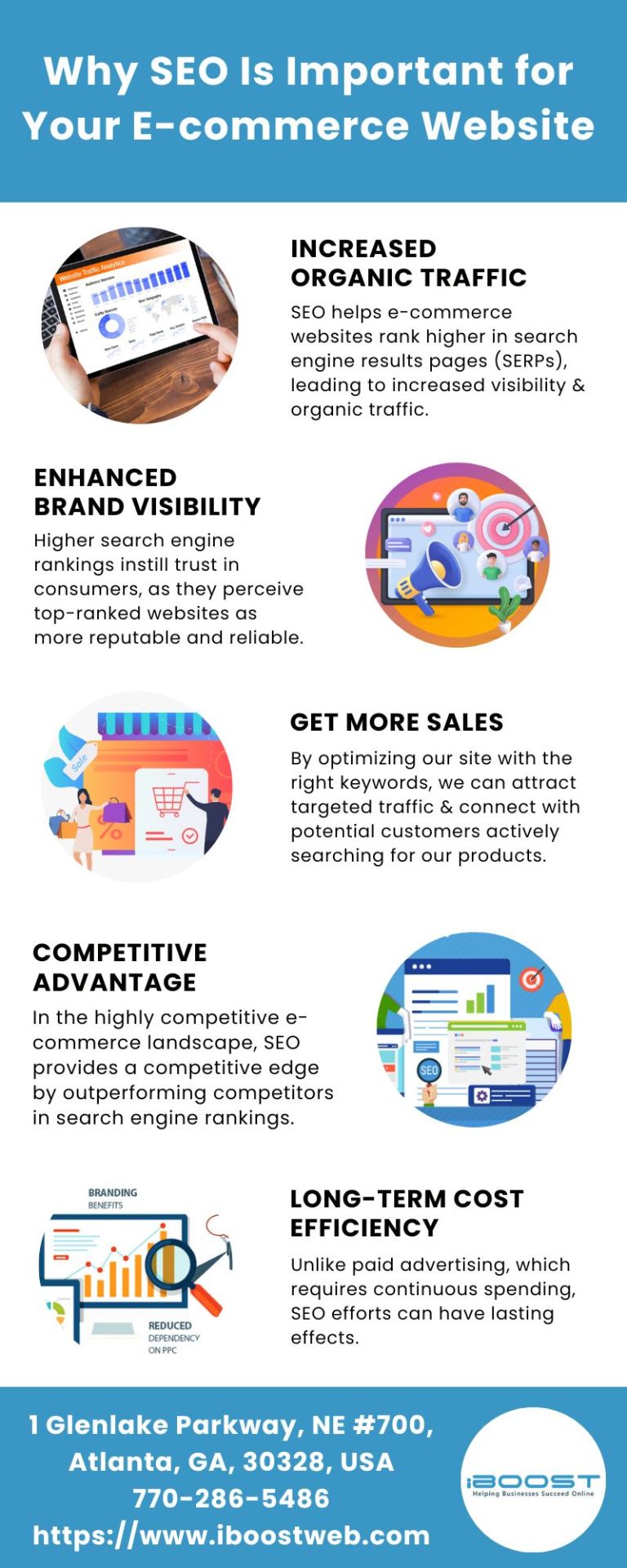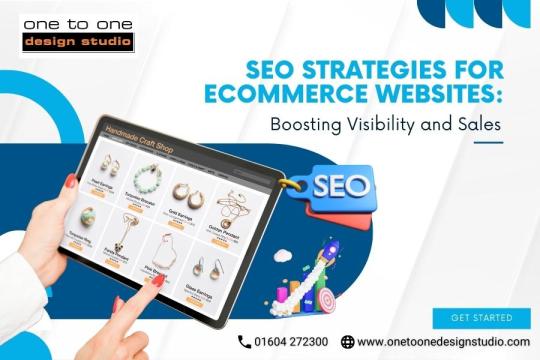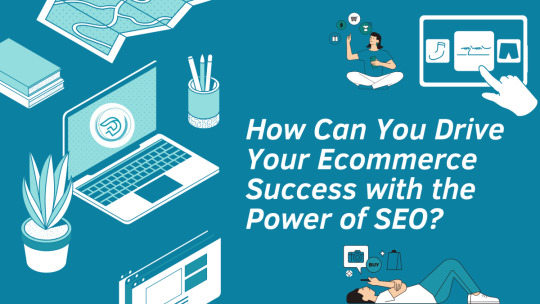#SEO for ECommerce
Text
The Ultimate Guide to SEO for eCommerce Websites
Just like baking a perfect cake requires the right ingredients and techniques, optimizing your eCommerce website for search engines takes careful planning and execution. If you’re an online retailer looking to boost your website’s visibility, increase organic traffic, and drive more sales, search engine optimization (SEO) is the key to success. In this post, we’ll walk you through the essential…

View On WordPress
3 notes
·
View notes
Text
5 Essential SEO Features for E-Commerce Platform
1 note
·
View note
Text
SEO Strategies To Boost Your ECommerce Sales | SynergyTop

Unlock the potential of your eCommerce business with SynergyTop’s insightful blog on “SEO for Ecommerce”: Strategies to Boost Your ECommerce Sales. Learn proven techniques to elevate your online store’s visibility and drive substantial sales. From keyword optimization to effective backlinking, delve into the world of search engine optimization tailored for eCommerce success. Stay ahead of the competition and watch your sales soar as you implement these strategic SEO tips. SynergyTop is your guide to unlocking the full potential of your online retail venture.
0 notes
Text

In today's digital world, SEO is essential for any e-commerce business looking to drive traffic, increase visibility, and boost sales. Implementing SEO best practices allows your e-commerce site to rank higher in search engines like Google so that customers can easily find your products and services. SEO ultimately provides a strong return on investment because it establishes your e-commerce brand as a leader within your niche. Doing SEO the right way leads to long-term gains in brand awareness, trust, and sales. If you want to hire a reliable SEO agency in Atlanta for your E-commerce site to increase sales and revenue then iBoost Web can be your best bet. For more details call us at 770-286-5486 or visit our site now.
1 note
·
View note
Text
#best ecommerce seo services#top ecommerce seo expert#ecoommerce seo firms#ecommerce seo#seo for ecommerce
0 notes
Text
Navigating the Digital Marketplace: A Comprehensive Guide to SEO for E-Commerce Success
In the rapidly evolving world of online retail, establishing a robust online presence is more critical than ever. Amidst the myriad strategies available, Search Engine Optimization (SEO) emerges as the linchpin for success in e-commerce. This comprehensive guide explores the intricacies of SEO tailored specifically for e-commerce, providing invaluable insights and actionable strategies to propel your online store to new heights.
Unveiling the E-Commerce SEO Landscape
In the vast digital landscape, where countless e-commerce platforms vie for attention, understanding the nuances of SEO is the first step toward gaining a competitive edge. E-commerce SEO is not merely about visibility; it's about creating a dynamic strategy that encompasses product optimization, user experience, and technical finesse.
The Power of Strategic Keyword Research
The foundation of a successful e-commerce SEO strategy is laid with strategic keyword research. Beyond generic terms, delve into the realm of long-tail keywords that encapsulate user intent. By seamlessly integrating these keywords into product descriptions, meta tags, and URLs, your online store communicates its relevance to search engines, driving targeted organic traffic.
Crafting Irresistible Product Pages
The crux of any e-commerce website lies in its product pages. Elevate them beyond mere listings by creating compelling product descriptions that not only showcase features but also resonate with your target audience. Optimize product images for both search engines and user experience, ensuring that each click leads to an engaging and informative product journey.
Mastering the Technical Aspects of E-Commerce SEO
Technical SEO forms the backbone of any successful online venture. From optimizing site speed and ensuring mobile responsiveness to implementing secure (HTTPS) connections, technical finesse directly impacts search engine rankings. Dive into structured data markup, employing schema.org, to provide search engines with contextual information that can result in rich snippets in search results.
The Symbiosis of User Experience (UX) and SEO
A seamless and enjoyable user experience is not just a luxury; it's a necessity for both user satisfaction and SEO success. Streamline navigation, incorporate clear calls-to-action, and optimize the checkout process to convert visitors into loyal customers. The harmonious relationship between UX and SEO is a recipe for sustained growth.
Content Marketing's Role in E-Commerce SEO
Beyond product pages, the magic of e-commerce SEO unfolds through content marketing. Develop a content strategy that goes beyond product listings, creating engaging blog posts that address customer queries, highlight industry trends, and showcase your products. A well-curated blog not only attracts organic traffic but establishes your brand as an authority in the industry.
Building a Network of High-Quality Backlinks
Backlinks are the currency of credibility in the digital realm. Cultivate a network of high-quality backlinks through strategic partnerships, influencer collaborations, and guest posts on reputable industry websites. Prioritize quality over quantity, as authoritative backlinks elevate your website's standing in the eyes of search engines.
Social Media's Indirect Impact on SEO
While social signals may not directly influence search engine rankings, a strong social media presence contributes significantly to brand visibility and audience engagement. Shareable content, customer testimonials, and promotions disseminated across social platforms indirectly enhance your SEO performance.
Continuous Monitoring, Adaptation, and Success
In the dynamic realm of e-commerce, success is an ongoing journey. Utilize tools like Google Analytics, Google Search Console, and e-commerce-specific platforms to monitor performance metrics. Regularly update and refresh content, staying abreast of industry trends, and adapt your strategies based on performance data.
1 note
·
View note
Text
SEO Strategies for Ecommerce Websites: Boosting Visibility and Sales

It is critical for an e-commerce website design company to comprehend the value of SEO services in Northampton. One tactic that helps online shops rank higher in search engine results is SEO for ecommerce.
1. Conduct Keyword Research Correctly
The very first stage in any e-commerce SEO effort is keyword research. It would be ideal if you were extremely vigilant and focused when searching for the keywords related to your e-commerce platform. You should aim for two things:
Determine the keywords that your target audience is using that are both relevant and optimized.
Use those keywords in your website's content optimization to improve its search engine ranking.
You can use a variety of tools, like Google Keyword Planner, SEMrush, Ahrefs, and Moz, to conduct keyword research correctly. You can find the ideal keywords for your e-commerce website with the help of these resources.
2. Optimize the On-Page SEO of Your Website
Making sure your keywords are in the appropriate places is the main goal of on-page SEO for e-commerce platforms. It's a method to make sure Google understands the exact purpose of your page. Because it enhances your appearance in other Search Engine Results Page (SERP) aspects, on-page SEO is crucial. The following are some of the variables that affect SERP ranking:
Title tags
Meta descriptions
Header tags
Product descriptions
Image alt tags
Internal linking
URL structure
3. Put Site Architecture First
Creating a simple site architecture is another crucial component of SEO for e-commerce. More efficient crawling and indexing of your website by search engines is possible with a well-organized site structure. It might also make it easier for visitors to navigate your website. Among the top site architectural recommended practices are:
Employ a simple, unambiguous URL structure.
To make your website easier for users to explore, employ breadcrumb navigation.
Establish internal links between relevant pages.
Utilize a sitemap to facilitate website crawling by search engines.
4. Make Your Website Mobile-Friendly
E-commerce websites must be optimized for mobile devices. Make sure your website is mobile-friendly because more and more consumers are shopping online from their mobile devices. You can improve user experience for your clients and rank higher in search engine results with a mobile-friendly website. The following are a few of the top strategies for mobile optimization:
Make use of a responsive design to accommodate various screen sizes.
Make sure your website loads quickly on mobile devices.
Make use of legible, large typefaces.
Employ succinct, straightforward calls to action.
5. Construct Superior Backlinks
An important component of SEO for e-commerce is backlinks. You can increase your website's traffic and search engine ranking with high-quality backlinks. The following are some top techniques for creating high-quality backlinks:
Produce content of such a caliber that other websites will want to link to it.
Make contact with other websites within your sector and request backlinks.
Build backlinks and advertise the material on social media.
To increase backlinks to your website, use guest posting.
6. Market Your Website on Social Media
Social networking is a potent weapon for SEO in e-commerce. You may increase website traffic and create backlinks to your content by promoting it on social media. The following are some recommended methods for promoting your website on social media:
To spread your material and increase backlinks, use social media.
Make use of social media to interact with your clients and increase brand recognition.
Make use of social media to advertise your goods and increase sales.
7. Keep an eye on your web analytics
For e-commerce SEO, tracking your website's metrics is crucial. You can pinpoint areas for growth and adjust your website's optimization by monitoring user activity and website traffic. The following are some best practices for keeping an eye on your website's analytics:
Track user activity and website traffic using Google Analytics.
To determine which parts of your website want upgrading, use heat maps.
Test various iterations of your website using A/B testing to maximize conversions.
Conclusion
To sum up, SEO for e-commerce is a complicated topic that calls for a solid understanding of it, careful consideration of Google's standards, careful analysis of buyer intent, and planned implementation. We provide SEO services in Northampton as an e-commerce website design company to assist you improve your website's search engine ranking and increase website traffic.
0 notes
Text
Thank You Marketing Jaipur for the mention!
#seo expert#best seo services#seo expert jaipur#seo marketing#seo expert in jaipur#seo company in jaipur#seo services#seo for ecommerce#seoservices
0 notes
Text
Mastering SEO Strategies: A Comprehensive Guide
Within the pages of this comprehensive guide, you will embark on a journey that unravels the intricacies of SEO, equipping you with the tools and strategies necessary to enhance online visibility, drive organic traffic, and achieve higher search engine rankings.
Key Highlights:
Fundamental SEO Concepts: Delve deep into the foundational principles of SEO, ensuring you have a solid grasp of the terminology, algorithms, and ranking factors that influence search engine results.
Keyword Research and Analysis: Learn the art of keyword research, selection, and optimization to target the right audience and drive relevant traffic to your website.
On-Page and Off-Page Optimization: Explore the intricacies of on-page SEO, including content optimization, meta tags, and website structure, as well as off-page techniques like link building and social signals.
Technical SEO Mastery: Uncover the technical aspects of SEO, such as site speed optimization, mobile-friendliness, and structured data markup, to ensure your website meets the latest search engine requirements.
Content Strategy: Discover how to create compelling, high-quality content that not only engages your audience but also attracts search engine attention.
Local and International SEO: Gain insights into optimizing for local and global audiences, and learn strategies to reach diverse markets effectively.
SEO Analytics and Performance Measurement: Master the art of tracking and analyzing SEO performance, using data-driven insights to refine your strategies for continuous improvement.
Algorithm Updates and Future-Proofing: Stay up-to-date with the latest search engine algorithm updates and adapt your SEO strategies to remain competitive in an ever-evolving digital landscape.
Mastering SEO Strategies: A Comprehensive Guide" is not just a book; it's your go-to resource for mastering the art and science of SEO. Whether you're a business owner looking to improve your online presence or an SEO professional aiming to refine your skills, this guide will empower you to navigate the complexities of SEO and drive meaningful results in the digital realm. Start your journey towards SEO mastery today with this indispensable resource.
0 notes
Text
Affordable SEO Plans for Small Businesses in Mumbai - Infozzle
Infozzle Software solution, Boost your small business with affordable SEO plans! Our app development agency offers expert ecommerce web development and mobile app design. Maximize online visibility with tailored SEO services packages for ecommerce websites. Stay ahead in the digital game and drive sales with our effective SEO for ecommerce.
#affordable seo plans#affordable seo plans for small business#affordable seo services packages#app development agency#ecommerce web development#ecommerce website development#mobile app design#seo for ecommerce
1 note
·
View note
Text
How Can You Drive Your Ecommerce Success with the Power of SEO?
Cracking the Code to Ecommerce Success with Daivignan Marketing Services
In the dynamic world of ecommerce, achieving unparalleled success demands strategic digital expertise. At Daivignan Marketing Services, we’re your partners in crafting a digital footprint that not only showcases your offerings but ensures your online store is easily discoverable. Join us on a journey through two…

View On WordPress
#business#Ecommerce SEO#search-engine-optimization#seo#seo for ecommerce#SEO FOR ECOMMERCE WEBSITES#seo for entrepreneurs#seo for small bussiness#seo for startups
0 notes
Text
6 Must-Know Basics of SEO for Web Developers that you should Learn

Dive into our blog and discover the six must-know basics of SEO that will elevate your web development skills to new heights.Read our blog now: https://www.codilar.com/ecommerce-website-6-must-know-basics-of-seo-for-web-developers/
1 note
·
View note
Text

DigitalHoper Technologies is a reliable SEO company. Our SEO Services Company provides a range of digital marketing services, including SEO, PPC advertising, social media marketing, content marketing, and email marketing. Our team of experts has extensive experience in optimizing websites and driving traffic to our client's sites. With a focus on delivering high-quality services that provide tangible results, DigitalHoper Technologies is an ideal partner for businesses looking to improve their online presence and reach their target audience.
Services we cover:
*Digital Marketing Services
*Web Marketing Services
*Website Designing Services
*Website Development Services
*SEO Services
*SMO Services
*PPC Services
*Website Maintenance Services
Site: https://shorturl.at/jvMP9
#seocompanyinnfaridabad#seoinfaridabad#seoservicesinfaridabad#ppcmarketing#ppcagency#seo for ecommerce#local seo#seo expert#marketingagency#socialmediamarketing#digitalmarketing
0 notes
Text
eCommerce digital marketing services help businesses thrive in the online marketplace. With strategies like search engine optimization, social media advertising, and email marketing, they drive targeted traffic, increase conversions, and boost sales. Gain a competitive edge with effective eCommerce digital marketing solutions.
#search engine optimization#seo agency#digital marketing#digitalmarketing#seo for ecommerce#ecommerce
0 notes
Text
Mastering E-Commerce Marketing: A Comprehensive Guide to Boost Your Online Store's Success

Having established the foundations of building an e-commerce store in our previous guide, we now delve into the next crucial step: effectively marketing your online shop. Mastering e-commerce marketing is critical in standing out from the competition and driving sales.
Understanding E-Commerce Marketing
E-commerce marketing involves promoting your online store and products to increase brand awareness, attract customers, and generate sales. It includes various digital marketing strategies, from SEO and content marketing to social media and email marketing.
Understanding e-commerce marketing begins with knowing your customer journey. This journey refers to the stages a customer goes through, from becoming aware of your brand to making a purchase and beyond. By understanding this journey, you can craft a marketing strategy that targets customers at each stage, increasing the likelihood of conversions.
SEO for E-Commerce
Search engine optimization (SEO) is a powerful tool in e-commerce marketing. Good SEO practices help your online store rank higher on search engine results pages (SERPs), increasing visibility and driving organic traffic.
To optimize your e-commerce site for SEO, focus on the following:
Keyword Research: Use tools like Google Keyword Planner or SEMRush to identify relevant keywords in your niche. Incorporate these keywords into your product descriptions, meta descriptions, alt text, and blog content.
Site Architecture: A well-structured site makes it easier for search engines to crawl your pages and for users to navigate your site. Each product should be no more than three clicks away from your homepage.
Mobile Optimization: More consumers are shopping on their smartphones, so a mobile-friendly site is crucial. Google also uses mobile-first indexing, meaning it primarily uses the mobile version of your site for indexing and ranking.
Page Speed: A slow-loading site can lead to higher bounce rates and negatively impact your SEO. Use tools like Google PageSpeed Insights to identify issues that may be slowing down your site.
Backlinks: Backlinks from reputable sites can boost your SEO by showing search engines that your site is trustworthy. Guest posting, influencer marketing, and creating high-quality, shareable content can help you earn backlinks.
Content Marketing for E-commerce
Content marketing involves creating and sharing relevant, valuable content to attract and engage your target audience. For e-commerce businesses, this can include blog posts, product guides, how-to videos, infographics, and user-generated content.
A blog can be a powerful content marketing tool. It can help you rank for more keywords, provide value to your audience, and position your brand as an expert in your niche.
User-generated content, such as customer reviews and photos, can also boost your marketing efforts. They provide social proof, build trust, and can improve conversion rates. Encourage user-generated content by hosting contests, featuring customer photos on your site, and asking for reviews.
Social Media Marketing for E-commerce
Social media is an indispensable tool for e-commerce marketing. It can help you build brand awareness, engage with your audience, and even sell directly through platforms like Instagram and Facebook.
To leverage social media marketing, first, identify where your target audience spends their time. If they're mostly on Instagram, focus your efforts there. If they're on LinkedIn, target that platform.
Next, create a content calendar to plan and schedule your posts. Use a mix of promotional, educational, and entertaining content to keep your audience engaged.
Finally, take advantage of social commerce features, such as shoppable posts and Facebook Shops. These features allow users to purchase directly from social media platforms, providing a seamless shopping experience that can boost conversion rates.
Email Marketing for E-commerce
Email marketing remains one of the most effective digital marketing strategies for e-commerce. It allows you to communicate directly with your audience, build customer relationships, and promote your products.
Here are some strategies to leverage email marketing:
Building an Email List: Offer a discount or free shipping in exchange for a visitor's email address. You can also use content upgrades, like a free eBook, to encourage sign-ups.
Segmenting Your List: Not all customers are the same. Segment your list based on factors like purchase history and browsing behavior to send more personalized and relevant emails.
Automated Email Campaigns: Set up automated campaigns like welcome series for new subscribers, cart abandonment reminders, and post-purchase follow-ups.
Testing and Optimization: Regularly test different elements of your emails, like subject lines and CTA buttons, to see what works best for your audience.
Pay-Per-Click Advertising for E-commerce
Pay-per-click (PPC) advertising is a model where you pay each time someone clicks on your ad. Platforms like Google Ads and Facebook Ads use PPC.
PPC can be highly effective for e-commerce businesses as it allows you to reach a large audience quickly and offers precise targeting options. You can target based on demographics, interests, behavior, and more.
To get the most out of your PPC campaigns, consider the following:
Keyword Research: Use relevant keywords to ensure your ads show up for the right search queries.
Ad Copy and Design: Create compelling ad copy and design that resonates with your target audience and encourages them to click.
Landing Page Optimization: Ensure your landing page is relevant to your ad and provides a seamless experience. It should also be optimized for conversions, with a clear CTA and minimal distractions.
Testing and Optimization: Regularly test different elements of your PPC campaigns to identify what works best and optimize accordingly.
Conclusion
E-commerce marketing can seem overwhelming, but by breaking it down into manageable parts, you can create an effective strategy that drives traffic and sales. Remember, the goal is not just to attract customers but to create loyal customers who keep coming back.
SEO, content marketing, social media marketing, email marketing, and PPC advertising are all crucial components of a successful e-commerce marketing strategy. By understanding and leveraging these strategies, you can propel your online store to new heights of success.
Marketing is a continuous learning process. Stay updated with the latest trends, always be testing and optimizing, and don't be afraid to try new strategies. With persistence and creativity, you can master e-commerce marketing and build a thriving online store.
Congratulations! You're now equipped with the knowledge to market your e-commerce business effectively. So go ahead and take the next step in your e-commerce journey. Happy marketing!
#ecommerce marketing#onlineshop#digital marketing#seo for ecommerce#content marketing#ContentMarketing#social media marketing#email marketing#ppc advertising#OnlineStoreSucess#ecommercegrowth#customer journey#keyword research#SiteArchitecture#mobileoptimization#pagespeed#backlinks#social commerce#email list building#Ecommerce2023
1 note
·
View note